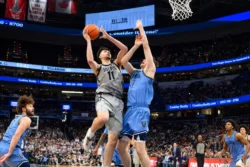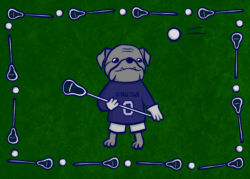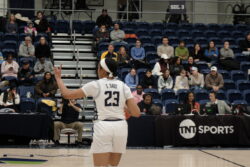You half expected there to be a sign on the front gate of Kehoe Field, just a little something simple to state the obvious, that there would be no Wagner-Georgetown football game this past Saturday.
In a way, you kind of wished that it would be there too?like so many Americans, there are plenty of people on campus whose lives may seem to revolve around Saturday afternoons, and it would be only after seeing this particular way of life having to be put on hold for the week that the reality might finally set in. No football this weekend. No hope of securing the first victory of the season. No tailgaters. And no screaming fans packing the stands with frenzied cheers of support.
Instead, in the minutes leading up to the scheduled 1:00 p.m. kickoff, the stands were empty, and there was only the same pervasive quiet present throughout the campus?and for that matter, throughout the nation?that had been present since terrorism shook the world last Tuesday morning. But the worst part may have been knowing that it would not be back to normal anytime soon.
Indeed, Saturday was, in the words of Georgetown football coach Bob Benson, “a strange day,” who admitted that he was almost lost in what to do with himself when he couldn’t be standing on the sidelines. For coaches and players who are used to spending so much time preparing for game day, “idle time is often a very difficult time.”
That’s why it was so important, after three days off, for the players to get back to the practice field. The team looked excited to be active once again, Benson said, despite the fact that they still had a full two weeks before their next game. The Wagner cancellation combined with an off date this weekend means the Hoyas will be inactive until a Sept. 29 trip to Fordham. After every weekend, the coach said, “one of the great things is getting back to prepare for that next opponent.” This makes such a lengthy break in midseason poses “a difficult challenge.”
Meanwhile, on the soccer fields, many of the emotions may be the same, but the difference is that the team has already had a chance to get back to competition. The men handily defeated St. Peter’s 5-2 on Tuesday (see “Hoyas score five goals, defeat St. Peter’s,” page 12), completing what coach Keith Tabatznik called their “best performance of the year” immediately after their best training session.
Tabatznik was extremely proud of his squad, saying that the effort proved how a group can come together to deal with a tragedy. Sports, he declared, are “one of the best ways to deal with stress,” and playing that first game was “an opportunity to re-focus” and just be able to release some energy.
The days leading up to the game were filled with positive feeling, from starting practice back up by just playing without coaching instruction to the minutes leading up to the start, when Tabatznik quoted President Bush’s speech to the American people in motivating the team. Finally, before the game got underway, a moment of silence was observed at Harbin Field to remember the victims of Tuesday’s tragedy.
The Big East schedule now begins Saturday with a game against rival St. John’s, ranked second overall in the national polls. The Red Storm enter the game undefeated and looking to lay claim to conference supremacy, but the Hoyas play them tough every year, and this will also be the first game for St. John’s since tragedy struck New York. Georgetown’s win Tuesday gives them a needed stepping-stone into the match. The Hoyas had been slumping before the season was put on hold, having ventured to the Smith Barney Soccer Classic in Vermont the previous weekend for two games which produced four overtimes and no victories.
The scheduled Big East opener last Saturday at, of all places, Pittsburgh, was postponed. Coach Tabatznik praised the conference for taking charge with a mandate that postponed all games the weekend after the attack and rescheduled them all for Nov. 6.
Some conference schools that had nonconference games may end up losing those games if the new schedule conflicts with their previous commitments. In the case of Georgetown, with the new game on the sixth tacked on to the end of the season, a contest against Seton Hall may be pulled back from Sunday the fourth to Saturday the third in order to provide an extra off-day.
For the football team, the scheduling front is less optimistic. The only open date to reschedule the Wagner game would be Nov. 24, after Thanksgiving. As such, the game most likely will not be played at all. Making the difficult move to the more competitive Patriot League this season, it was especially tough for the Hoyas to lose a winnable game: They were evenly matched against the Seahawks after being the underdogs in every other game this season. Next up is Fordham, whom the Hoyas haven’t beaten in six tries dating back to 1983. Benson noted that we should all “give the University credit” for making a quick decision to cancel last week’s games.
It was the right the right thing to do in all aspects,” Benson said.
Both Benson and Tabatznik stressed the importance of keeping sports in perspective, and it was up to Benson, the history major, to try to speak of the overall scope of the incident as well.
“This is devastating, something that has changed everything?a tragedy beyond the wildest imagination,” Tabatznik said.
On top of that, Benson reflected that there might not be another school that was hit harder than Georgetown. Included among those still missing from the World Trade Center attack are members of his ‘95 football team. “We don’t want to give up hope. We’re trying to stay positive,” he said, adding that his thoughts and prayers remained with the families of victims inside and out of the Georgetown community.
In the end, Tabatznik described what role sports could have in the healing process. Athletics, he explained, teach life lessons.
“Here at Georgetown, there is a very good understanding of the role sports are supposed to have, what exactly you are trying to get out of it,” he said.
For all of the sadness that accompanied the tragedy of Sept. 11, it allowed members of the sports community to become closer to one another, and to realize what sports can do for the country’s emotional state, as Tabatznik proclaimed his love of the school and the nation.
“I’m proud to be an American citizen, and proud to be a part of the Georgetown community,” he said.
It’s a message that nobody will ever be able to forget from now on when they step on to the playing field.





